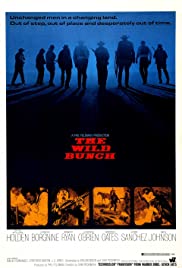
THE WILD BUNCH
US, 1970, 143 minutes, Colour.
William Holden, Ernest Borgnine, Robert Ryan, Edmond O' Brien, Warren Gates, Jaime Sanchez, Ben Johnson.
Directed by Sam Peckinpah.
The Wild Bunch heralded in the widespread popularity of the serious Western, especially the Western that decries conventional violence by portraying it over-realistically and almost to excess. It is also one of the now numerous Westerns that de-glamorises the West and shows its heroes as ageing or superseded by the age of machines or both. Sam Peckinpah had shown something of this in Ride the High Country (sometimes called - symbolically? - Guns in the Afternoon). He took the theme up in his Western poem, The Ballad of Cable Hogue.
The Wild Bunch is certainly violent, beginning and ending with large-scale massacres in which most of the dying is pointless. The Bunch is led by ageing men or real old-timers and their chief pursuer is a former member of the Bunch. He, too, is ageing. Only the Mexican boy has youth on his side. But his throat is cut.
William Holden gives an excellent performance as the leader of the Bunch - hard, proud, the only man with the strength to keep the Bunch together. Ernest Borgnine, Robert Ryan and Warren Dates effectively do what they have done before. Edmond O' Brien enjoys himself in an outstanding character performance, a type of old scruffy chorus for the whole proceedings.
Many audiences found The Wild Bunch nothing more than an overlong, ugly violent yet boring chase. Others found it a brilliant critical look at all the old myths of the great West and found them wanting.
1. This is a violent Western. Did you find the violence over-done or revolting or did you think there was a message in the use of excess violence?
2. What do you think director Peckinpah’s attitude towards violence in the west? What do you think director Peckinpah’s attitude towards the conventional Western is?
4. What was the significance of the children enjoying the ants and the scorpions ?
5. Children enjoying torture open the film; children's faces recur during the film and Pike Bishop is shot by the boy who wanted to be a general. What was the meaning of this use of children? Was Peckinpah pessimistic about the way they would grow up?
6. The story of the film was framed in two massacres, How important was this for the film? The blood? The bystanders? Slow motion?
7. What kind of men were the Bunch? Did they have any likeable qualities as persons?
8. What kind of men were the railroad people and the bounty hunters? Were they any different from the Bunch except that they were on the other side?
9. Did the film build up a sufficiently dramatic conflict between Pike Bishop and Ike Thornton? - their past, Thornton's torture, the technique of slipping from one man 's flashbacks to the other's memories ?
10. Some critics see old Sykes as a kind of chorus in the film, commenting on events, personalities and laughing at them. Do you think this is one of his major rivals?
11. How were the Mexican villagers presented - sympathetically? As oppressed? Emotional - the Bunch's leaving to the Villager's song.
12. Comment on the success of some of the action sequences – the chases, the confrontation with Mapache, the detailed robbing of the ammunition train, the pursuit and the blowing up of the bridge (horse and riders falling into the river), the outwitting of Mapache's henchmen about the ammunition.
13. Did the film give you any clear ideas about the state of Mexico in 1914 - Mapache's brutality, the peasant's revolt, the German advisers?
14. Did the Bunch realise they would die when they went back to rescue their Mexican companion? Why did they go? Did they realise that they were ageing (this theme was mentioned a number of times during the film), that they were losing their place in a world of machine-guns and cars?
I5. Did they seem to you to die heroically - why? At least they were loyal to one another. Is loyalty an outstanding human quality?
16. What was the significance of the screenplay's letting Thornton and Sykes survive? Did this imply that the differences didn't really matter and that the whole affair was not really important?
17. Did you feel that the shots of the members of the Bunch smiling at the end of the film offered them too much sympathy or implied that we should forgive them?
18. Did you like the Bunch by the end of the film? Why? If you did not like them, did you, at least, understand them better?